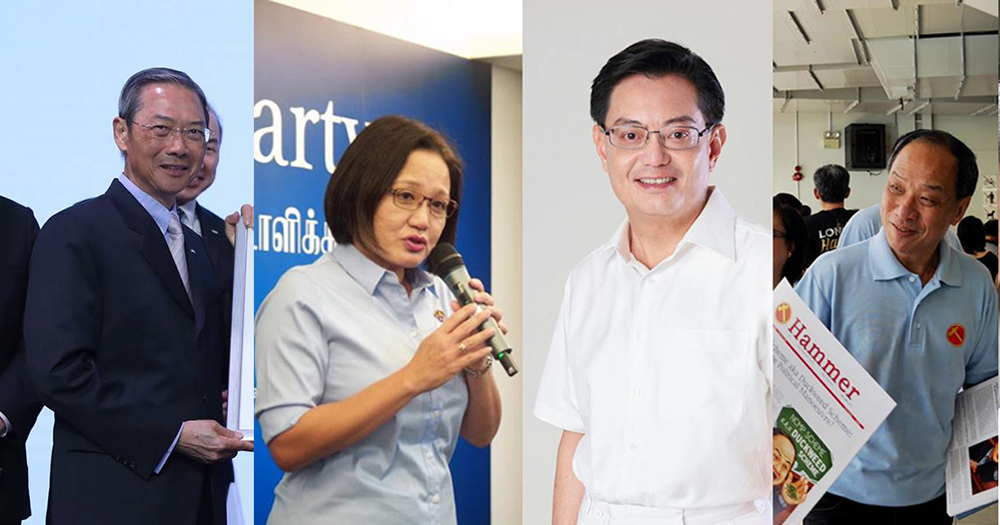An Introduction to the Culture and History of the Teochews in Singapore presents an overview of the Teochews in Singapore, through information compiled from multiple sources in English and Chinese.
The book, edited by Tan Gia Lim, examines their culture, historical presence in the region, and contributions to Singapore's society.
An Introduction to the Culture and History of the Teochews is published by World Scientific, and you can get a copy of it here.
Here, we reproduce an excerpt from the book on Teochew involvement in Singaporean politics.
***
Why are there so many Teochew ministers?
Singapore’s founding Prime Minister Lee Kuan Yew commented in the 1998 book Lee Kuan Yew: The Man and His Ideas on the disproportionate number of Teochews in the Singapore cabinet.
“Look at the number of smart Teochews there are ... just count them. Teo Chee Hean, Lim Hng Kiang, George Yeo, Lim Boon Heng. Is it a coincidence? In a Cabinet of 15, how do you explain that?”
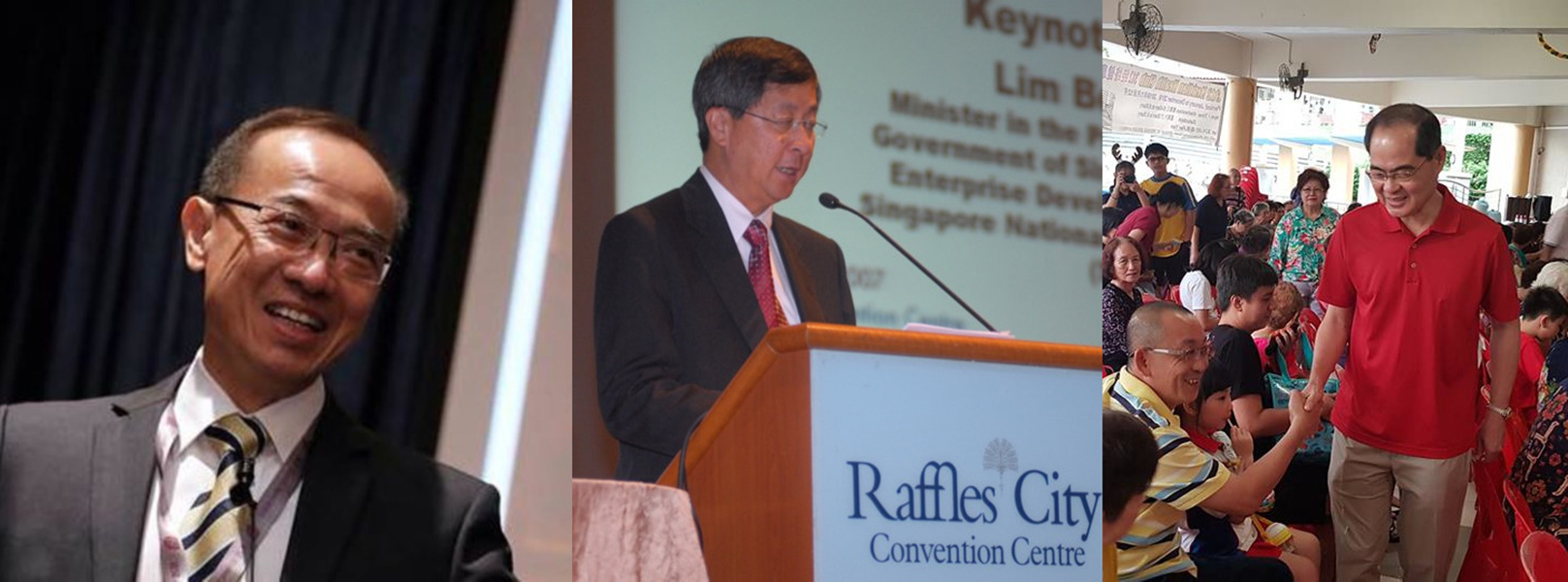 Source: George Yeo Facebook, Wikipedia, Lim Hng Kiang Facebook
Source: George Yeo Facebook, Wikipedia, Lim Hng Kiang Facebook
At the time of the book’s publication, the Singapore cabinet had 12 Chinese ministers of whom five were Teochews which include Lee Boon Yang in addition to the four names mentioned by Lee Kuan Yew.
This was not the first time in Singapore’s political history where Teochew representation outnumbered its 20 per cent representation in the Chinese population.
In the 1955 landmark Legislative Assembly election where Lee Kuan Yew won his first election in the ward of Tanjong Pagar, a total of 16 Chinese were elected into the Legislative Assembly with him, and half of these elected Chinese were Teochews representing various political parties.
Tans blanketed the sky, Chuas ruled the grounds, Seah is the emperor
The Teochews had actively participated in Singapore’s administration since its early colonial days.
The British government established the Straits Settlements as a separate Crown Colony on April 1, 1867 ruled by a governor with the assistance of an executive council and a Legislative Council.
The colonial government engaged the Chinese community by appointing selected Chinese to positions in the Legislative Council and later the Chinese Advisory Board.
Seah Liang Seah was the second Chinese to be appointed as a member of the legislative council in 1883 and he also served as a Municipal Commissioner and a member of the Chinese Advisory Board.
In 1872 Tan Seng Poh became the first Chinese to be a Municipal Commissioner.
The Teochews’ influence in 19th century Singapore was summed by a Teochew phrase “The Tans blanketed the sky (world), Chua ruled the grounds and Seah is the emperor.” (陈天蔡地佘皇帝).
According to renowned historian Hsu Yun Tsiao, the phrase refers to prominent Teochew merchants such as Tan Seng Poh and Tan Yeok Nee who dominated the gambier and opium trade, Chua Moh Choon who was the leader of secret society Ghee Hok Kongsee and Seah Eu Chin who was appointed as a senior member of the jury council and presided over many local lawsuits in 19th century Singapore.
In 1889, then Governor of the Straits Settlement Sir Cecil Clementi set up the Chinese Advisory Board in Singapore to facilitate communication between the colonial government and the Chinese community.
The board consisted of the Chinese Protector and a body of representative Chinese from various dialect groups to advise the colonial government on Chinese affairs.
The Teochews were assigned five out of 17 places on the Chinese board, and early Teochew representatives were Seah Liang Seah, Tan Yong Siak, Low Cheang Yee and Koo Ngee Choo.
Other Teochews who served on the board later included Lau Long Teng (1921), Leow Chia Heng (1921 - 1929), Seah Eng Tong (1921 - 1941), Tan Thuan Hian (1921 - 1925), Heng Pang Kiat (1922 - 1929), Tan Tsz Yew (1924 - 1930), Tan Guan Chua (1929 - 1941), Lee Wee Nam (1930 - 1941), Lee Kim Soo (1931 - 1934), Low Peng Soy (1934 - 1938), Tan Chin Hian (1937 - 1939) and Lim Soo Siam (1938 - 1941).
Stepped up for Singapore's self-governance
As Singapore moved towards self-government and independence, the Teochews became heavily involved in Singapore’s post-war political scene.
The first general election in Singapore was held on March 20, 1948, when six of the 22 seats on the Legislative Council became directly-elected as provided under the 1947 Singapore Legislative Council Elections Ordinance.
While voting eligibility was limited to registered adult voters over the age of 21 who had been British subjects for at least a year prior to the election, it was nevertheless a milestone in the political history of Singapore.
The Progressive Party led by Tan Chye Cheng won three out of the six seats. Tan, son of Tan Guan Chua, founded the Progressive Party with John Laycock and Nazir Ahmad Mallal in August 1947 and became the party’s first president.
Tan was elected for the Municipal South-West division in 1948 and the Tanglin division in the 1951 election.
The Rendel Commission Report of 1954 paved the way for internal self-government in Singapore by recommending constitutional reforms that increased local participation in politics.
Two key recommendations of the report was the automatic registration of voters and the transformation of the Legislative Council into a Legislative Assembly with majority of its members elected.
With most of the recommendations accepted, the Rendel Constitution was implemented by the Colony Order-in-Council of 1955.
On April 2, 1955, the Legislative Assembly general election was held to elect 25 out of the 32 members, and eight Teochews representing various political parties were elected.
They were Goh Tong Liang, Lim Koon Teck and Lim Choon Mong for the Progressive Party; Lim Cher Kheng for the Democratic Party; Seah Peng Chuan, Tan Theng Chiang and Lee Choon Eng for the Labour Front; and Goh Chew Chua for the People’s Action Party.
At present, Teochews feature prominently in both the ruling party and opposition
Within the PAP
Since Singapore’s independence, many Teochews have been elected into Singapore's parliament and continue to contribute to Singapore’s nation building.
Then-Deputy Prime Minister Lee Hsien Loong commented in his speech at the opening of the 12th Teochew International Convention in 2003 that “out of 19 full Cabinet Ministers, seven, or about one-third, are Teochews.
In Parliament, out of a House of 94 members, close to 30, also about one-third, are Teochews. This is well above their proportion in the population, which is about 15 per cent.”
Past cabinet ministers of Teochew ethnicity included Yeo Cheow Tong, Yeo Ning Hong, Lee Boon Yang, George Yeo, Lim Hwee Hua and Lim Boon Heng. Lim Hwee Hua became Singapore’s first female Cabinet minister when she was appointed Minister in the Prime Minister’s Office in 2009.
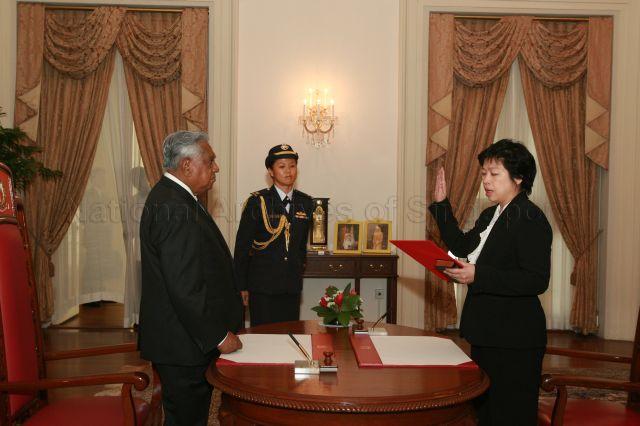 President S R Nathan presiding over swearing-in ceremony of Minister, Prime Minister's Office Lim Hwee Hua at Istana West Drawing Room. Source: National Archives of Singapore
President S R Nathan presiding over swearing-in ceremony of Minister, Prime Minister's Office Lim Hwee Hua at Istana West Drawing Room. Source: National Archives of Singapore
As of September 2017, full ministers who are Teochews are Teo Chee Hean (Deputy Prime Minister and Coordinating Minister for National Security), Lim Hng Kiang (Minister for Trade and Industry (Trade)), Lim Swee Say (Minister for Manpower), Ng Chee Meng (Minister for Education (Schools) and Second Minister for Transport) and Heng Swee Keat (Minister for Finance).
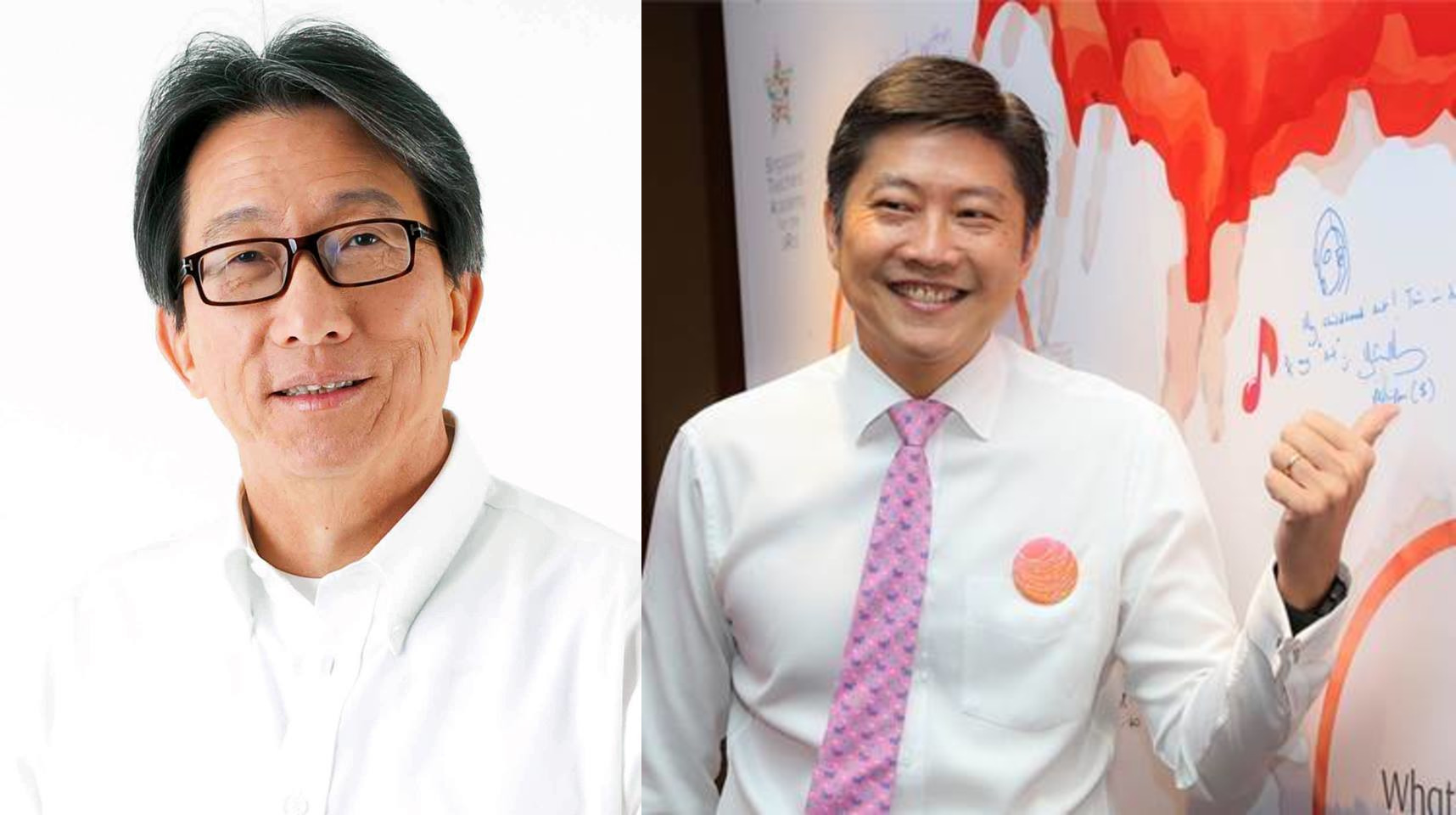 Source: Lim Swee Say and Ng Chee Meng Facebook
Source: Lim Swee Say and Ng Chee Meng Facebook
Among opposition
Teochews also featured prominently in opposition politics in post-independence Singapore.
In 1991, a Teochew, Low Thia Khiang contested in and won the ward of Hougang as a candidate for the Workers’ Party.
Against the backdrop of a national Speak Mandarin Campaign, Low used the Teochew dialect in his rally speeches to appeal to the Teochew constituents, and his election success started a pattern of Teochew-speaking candidates contesting in Hougang.
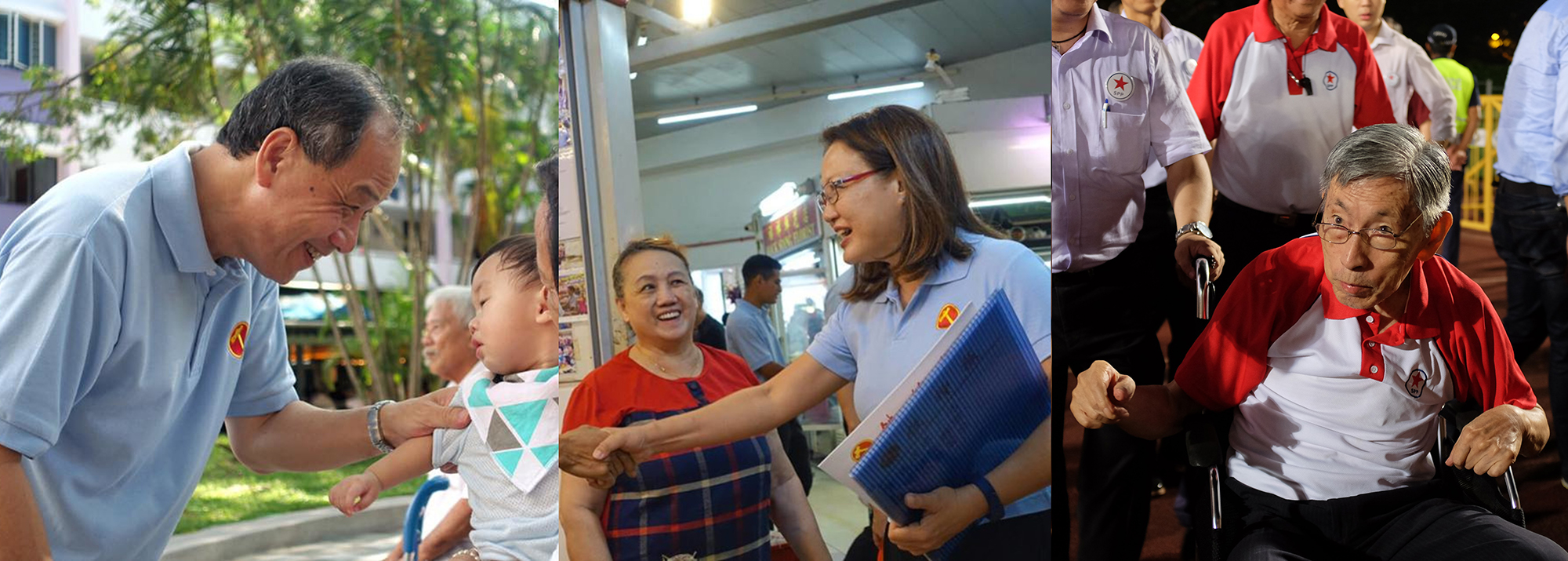 Source: Workers' Party Facebook and Flickr
Source: Workers' Party Facebook and Flickr
In the 2011 General Election, Low, as secretary-general of the Workers’ Party, together with Workers’ Party Chairperson Sylvia Lim, also a Teochew, led a five-person team to become the first opposition party to win a Group Representation Constituency (GRC) in Singapore when he wrestled the Aljunied GRC from the ruling People’s Action Party.
Another Teochew, Chiam See Tong, was Singapore’s only elected opposition MP from 1986 to 1991.
He was the longest-serving opposition MP when he represented the constituency of Potong Pasir from 1984 to 2011, and this record will be superseded by Low Thia Khiang when the latter completes his term.
Foreign-funding political activity in 20th-century China
The Singapore Teochews were also active in the politics of modern China. When Dr Sun Yat-sen was promoting his revolutionary agenda to overthrow the Qing government, many in the overseas Chinese communities rose to his support.
His earliest supporters in Singapore were Teo Eng Hock, Tan Chor Nam and Lim Nee Soon who led the effort to raise funds and garner support for the various uprisings. Teo Eng Hock and Lim Nee Soon were Singapore-born Teochews who donated generously to the revolutionary cause, and they set up several newspapers to promote revolutionary ideas to the local Chinese community.
Teo Eng Hock donated a villa Wan Qing Yuan (晚晴园) located at the Balestier area to serve as the operating base for the Singapore branch of Tongmenghui (同盟会) when it was formed in 1906.
The first uprising planned by Dr Sun after the founding of the Tongmenghui was the Chaozhou Huanggang Uprising (丁未潮州 黄冈武装起义) on May 22, 1907 in Huanggangzhen, Raoping.
Largely funded by the Chinese in Singapore and planned in Wan Qing Yuan, it was the result of collaboration between Teochews in Singapore and Chaozhou and was led by Singapore-based Teochew Koh Soh Chew (许雪秋).
Lim Nee Soon was known to infiltrate into Chaozhou to distribute materials prior to the uprising. The revolutionaries managed to capture Huanggangzhen but the Qing government was quick to suppress the uprising and around 200 revolutionaries were killed.
More uprisings were planned but when they failed, a few hundred revolutionaries fled to Singapore and Teo Eng Hock provided them with accommodation and even set up a company to provide them employment.
Other active Teochew supporters included Lin Shouzhi (林受之), Chen Yunsheng (陈芸生), Shen Lianfang (沈联 芳), Xu Weixin (许唯心) and Xiao Zhuyi (萧竹漪).
Even after overthrowing the Qing government, many Teochews in Singapore continued to provide support to Dr Sun and the Republic government in the building of the new China.
Lim Nee Soon hosted several of Dr Sun’s supporters from the ruling Kuomingtang when they were in Singapore.
Teo Eng Hock was in China from 1932 - 40 serving numerous posts with the government of the Republic of China including mayor of Shantou.
Top image collage from Teo Chee Hean Facebook, Heng Swee Keat Facebook, Workers' Party Facebook
If you like what you read, follow us on Facebook, Instagram, Twitter and Telegram to get the latest updates.
